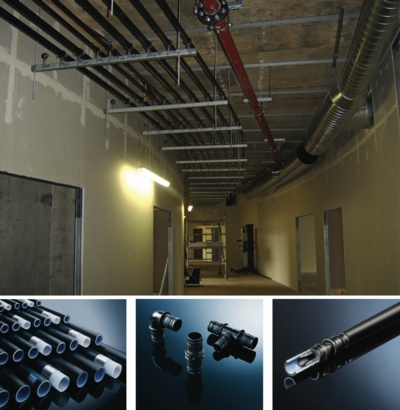Bend me, shape me
Does this pipe system combine the best feature of metal and plastics? Simon Spridgeon argues the case for Geberit’s Mepla system.
The construction industry is increasingly moving towards using press-fit piping systems and flame-free pipe jointing in applications involving potable water for hot and cold water supplies, heating, cooling and chilled water systems and also compressed air. Not only can this method reduce the overall installation time, but in the case of Geberit’s Mepla system, is flexible, durable and simple to use, helping to further shorten installation times on light-commercial installations.
The Mepla system combines multi-layer piping with PVDF and gun-metal fittings. The pipework itself consists of three layers bonded into a single unit.
The high density polyethylene (HDPE) outer layer is non-reactive, fire retardant, flexible and corrosion resistant, providing system protection and UV resistance.
The central edge-welded aluminium layer offers mechanical stability to ensure that the pipe remains in its required position yet remains flexible enough to bend. The aluminium layer also provides an oxygen barrier, making it suitable for use in central-heating systems and makes the pipe detectable by electronic devices after installation.
The cross-linked polyethylene (PE) inner layer is resistant to cracking, aging and general wear and tear, as well as being non-reactive and corrosion resistant, making it suitable for use in both plumbing and potable-water applications. The inner PE layer also provides extreme resistance to limescale, significantly enhancing the hygiene qualities of the pipe. The low internal surface roughness (7 µm) has excellent acoustic insulation properties, so water passing through the pipework produces much less noise than in metal piping.
All layers are bonded with adhesive.
Mepla helps to reduce installation times on site by up to half, as the system features the latest press-fit pipe technology. The only tools needed to form a reliable, tight and durable connection are a cutter, deburrer and press tool, so joints can be easily made by any installer.
As well as a lower insurance premium, the absence of a working flame also minimises the risk of damage to existing fittings and fixtures. The Mepla system also offers a visually attractive connection, with no unsightly excess solder and only straight shapes on the outside.

One of the major benefits of this product is a fail-safe method of checking for unpressed joints. Unpressed fittings are designed to leak slightly during pressure testing, and any unpressed fittings can be pressed without having to drain down the entire system.
The Mepla system also helps to reduce the carbon footprint of a building, as the pipe system is 100% recyclable. It is a poor heat conductor (thermal conductivity of 0.43 W/mK so it loses around 800 times less heat than copper piping). Another key benefit is five times less expansion than PEX and eight times less than polybutylene pipes, it can be bracketed like copper pipe.
The piping is lightweight and has a low intrinsic value when compared to metals such as copper, reducing the risk of thefts from site.
The flexibility of the system enables most the pipes to be bent into their required position. 16 to 26mm pipes can be bent by hand. Sizes up to 50 mm can be safely bent without the risk of de-lamination or kinking using the appropriate tool to reduce the number of fittings required.
The pipework can easily cope with any curvature of a building, one of the key benefits which led to Mepla being specified for installation on a £32 million school renovation project at Whitmore High School in Harrow recently (illustrated). Here Mepla was specified for the LTHW and water services for the building as it enabled contractors to fulfil the very specific design considerations involved.
‘We found that the system was quick and clean to install on site, which was very important for us,’ explained NG Bailey’s mechanical project manager Paul Williams, the contractor responsible for the M&E services on this £32 million project. ‘Our fitters were able to be trained on site on jointing the products with the simple press-fitting tools in just one hour.’
Available in diameters from 16 to 75 mm, Mepla has a maximum operating pressure of 10 bar and temperatures of up to 85° with a short-term peak of up to 95°C for a maximum of 150 h a year. The most common sizes (16, 20 and 26 mm) are available pre-insulated to further reduce installation times.







